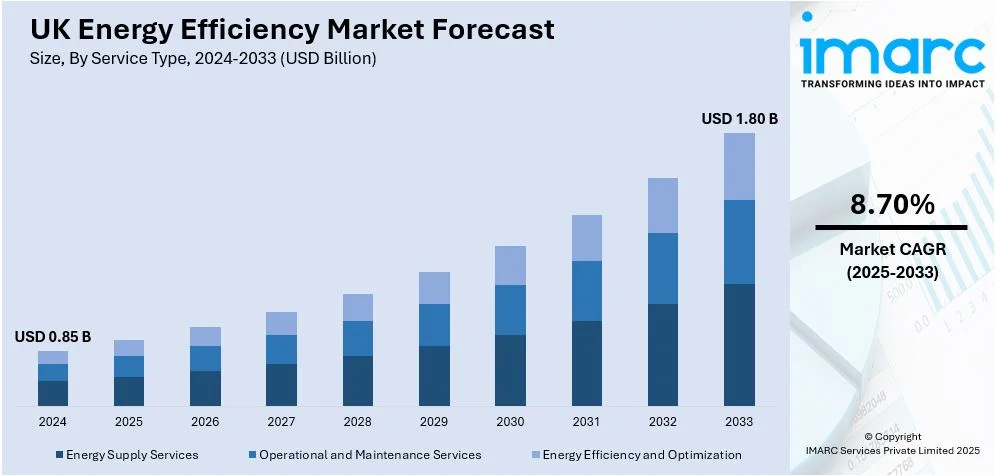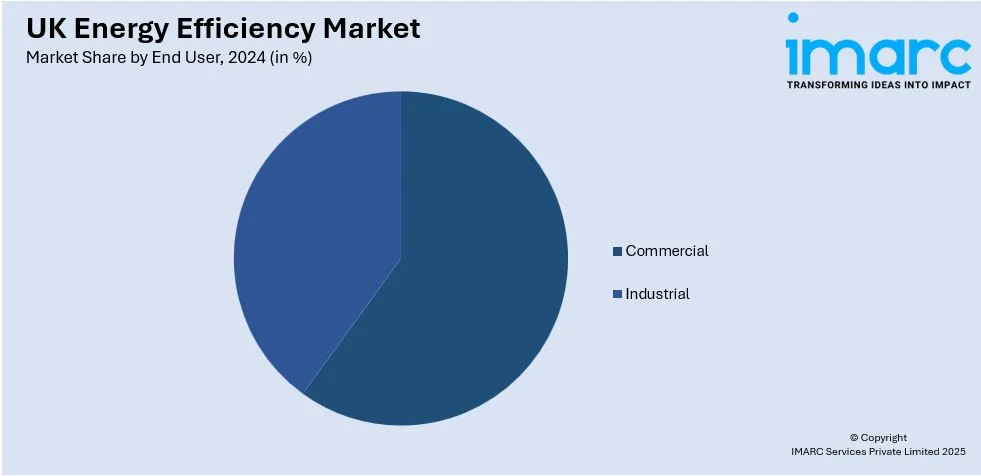
UK Energy Efficiency Market Size, Share, Trends and Forecast by Service, Type, End User, and Region, 2025-2033
UK Energy Efficiency Market Size and Share:
The UK energy efficiency market size reached USD 0.85 Billion in 2024. Looking forward, IMARC Group expects the market to reach USD 1.80 Billion by 2033, exhibiting a growth rate (CAGR) of 8.70% during 2025-2033. The market is rapidly growing, driven by the rising energy costs, continual technological advancements, increasing implementation of corporate sustainability commitments, industry collaboration and partnerships, supportive government schemes and financial incentives, and the growing climate change concerns among the masses.
|
Report Attribute
|
Key Statistics
|
|---|---|
|
Base Year
|
2024
|
|
Forecast Years
|
2025-2033
|
|
Historical Years
|
2019-2024
|
| Market Size in 2024 | USD 0.85 Billion |
| Market Forecast in 2033 | USD 1.80 Billion |
| Market Growth Rate (2025-2033) | 8.70% |
UK Energy Efficiency Market Trends:
Supportive government policy and regulations
The energy company obligation (ECO) and the green deal are both initiatives that have set high objectives for cutting energy usage in homes and businesses. The government aims to get to zero emissions of carbon, which emphasizes how important energy efficiency is to achieve. For instance, the UK government launched a clean electricity plan, with NESO confirming a 2030 transition is feasible, lowering costs and securing £40 billion annual investment, creating skilled jobs and reducing energy bills nationwide. The investments in technologies and energy conservation practices is promoted by regulatory frameworks that give financial support, such as grants, subsidies, and incentives for both homeowners and businesses. Also, regulations requiring that buildings obtain energy performance certificates (EPCs) motivate authorities to enhance energy efficiency levels within properties to meet the necessary criteria. These policies set the stage for successful investments in energy-efficient solutions, motivating innovation and stirring up provider competitiveness.

Consumer awareness and engagement
Consumer awareness is a vital driver of the energy efficiency market in the UK. Increased public knowledge about the benefits of energy efficiency both in terms of cost savings and environmental impact has led to greater demand for energy-efficient products and services. Educational campaigns, community initiatives, and social media influence have all contributed to a shift in consumer behavior, with more individuals actively seeking ways to improve their energy efficiency. For instance, in December 2024, Economy Minister Conor Murphy launched the Save Energy, Save Money campaign to lower bills through energy efficiency. Running until March 2025, it promotes consumer savings and awareness of Northern Ireland’s net-zero transition. The rise of eco-consciousness among consumers has also spurred interest in sustainable living practices, further fueling demand for energy-efficient solutions. Engaged consumers are more likely to invest in home improvements, such as better insulation and energy-efficient appliances, while businesses are increasingly adopting sustainability initiatives to appeal to environmentally conscious customers.
Climate change awareness
The growing awareness of climate change is significantly influencing the UK energy efficiency market. As the effects of climate change become increasingly apparent, there is a strong societal push for more sustainable practices, leading to greater emphasis on reducing carbon footprints. For instance, in February 2025, The UK government proposes raising private rental energy efficiency to EPC C by 2030, aiming to cut energy bills, reduce emissions, and meet statutory fuel poverty and carbon reduction targets. Public concern over environmental issues has prompted both individuals and organizations to seek ways to mitigate their impact, with energy efficiency emerging as a crucial solution. The urgency to transition to low-carbon energy sources and enhance energy efficiency aligns with governmental commitments to achieve net-zero emissions. This heightened awareness has resulted in increased demand for energy-efficient products and services, such as electric vehicles, energy-efficient heating systems, and sustainable building practices. Additionally, businesses are recognizing that enhancing energy efficiency can bolster their reputations and meet stakeholder expectations.
UK Energy Efficiency Market Segmentation:
IMARC Group provides an analysis of the key trends in each segment of the market, along with forecasts at the region/country level for 2025-2033. Our report has categorized the market based on service type and end user.
Service Type Insights:
- Energy Supply Services
- Operational and Maintenance Services
- Energy Efficiency and Optimization
The report has provided a detailed breakup and analysis of the market based on the service type. This includes energy supply services, operational and maintenance services, and energy efficiency and optimization.
End User Insights:

- Commercial
- Industrial
A detailed breakup and analysis of the market based on the end user have also been provided in the report. This includes commercial and industrial.
Regional Insights:
- London
- South East
- North West
- East of England
- South West
- Scotland
- West Midlands
- Yorkshire and The Humber
- East Midlands
- Others
The report has also provided a comprehensive analysis of all the major regional markets, which include London, South East, North West, East of England, South West, Scotland, West Midlands, Yorkshire and The Humber, East Midlands, and Others.
Competitive Landscape:
The market research report has also provided a comprehensive analysis of the competitive landscape. Competitive analysis such as market structure, key player positioning, top winning strategies, competitive dashboard, and company evaluation quadrant has been covered in the report. Also, detailed profiles of all major companies have been provided.
UK Energy Efficiency Market News:
- On 30th April 2024, Barclays announced extension of its partnership with British Gas to offer its UK residential mortgage customers half-price Home Health Checks for £50, including a complimentary Energy Performance Certificate. The initiative aims to help homeowners improve energy efficiency by providing personalized recommendations to lower energy consumption and reduce bills. This offer is part of Barclays' Greener Homes Strategy, designed to address confusion around energy upgrades and incentivize eco-friendly home improvements.
UK Energy Efficiency Market Report Coverage:
| Report Features | Details |
|---|---|
| Base Year of the Analysis | 2024 |
| Historical Period | 2019-2024 |
| Forecast Period | 2025-2033 |
| Units | Billion USD |
| Scope of the Report |
Exploration of Historical Trends and Market Outlook, Industry Catalysts and Challenges, Segment-Wise Historical and Future Market Assessment:
|
| Service Types Covered | Energy Supply Services, Operational and Maintenance Services, Energy Efficiency and Optimization |
| End Users Covered | Commercial, Industrial |
| Regions Covered | London, South East, North West, East of England, South West, Scotland, West Midlands, Yorkshire and The Humber, East Midlands, Others |
| Customization Scope | 10% Free Customization |
| Post-Sale Analyst Support | 10-12 Weeks |
| Delivery Format | PDF and Excel through Email (We can also provide the editable version of the report in PPT/Word format on special request) |
Key Questions Answered in This Report:
- How has the UK energy efficiency market performed so far and how will it perform in the coming years?
- What is the breakup of the UK energy efficiency market on the basis of service type?
- What is the breakup of the UK energy efficiency market on the basis of end user?
- What is the breakup of the UK energy efficiency market on the basis of region?
- What are the various stages in the value chain of the UK energy efficiency market?
- What are the key driving factors and challenges in the UK energy efficiency?
- What is the structure of the UK energy efficiency market and who are the key players?
- What is the degree of competition in the UK energy efficiency market?
Key Benefits for Stakeholders:
- IMARC’s industry report offers a comprehensive quantitative analysis of various market segments, historical and current market trends, market forecasts, and dynamics of the UK energy efficiency market from 2019-2033.
- The research report provides the latest information on the market drivers, challenges, and opportunities in the UK energy efficiency market.
- Porter's five forces analysis assist stakeholders in assessing the impact of new entrants, competitive rivalry, supplier power, buyer power, and the threat of substitution. It helps stakeholders to analyze the level of competition within the UK energy efficiency industry and its attractiveness.
- Competitive landscape allows stakeholders to understand their competitive environment and provides an insight into the current positions of key players in the market.
Need more help?
- Speak to our experienced analysts for insights on the current market scenarios.
- Include additional segments and countries to customize the report as per your requirement.
- Gain an unparalleled competitive advantage in your domain by understanding how to utilize the report and positively impacting your operations and revenue.
- For further assistance, please connect with our analysts.
 Request Customization
Request Customization
 Speak to an Analyst
Speak to an Analyst
 Request Brochure
Request Brochure
 Inquire Before Buying
Inquire Before Buying




.webp)




.webp)












